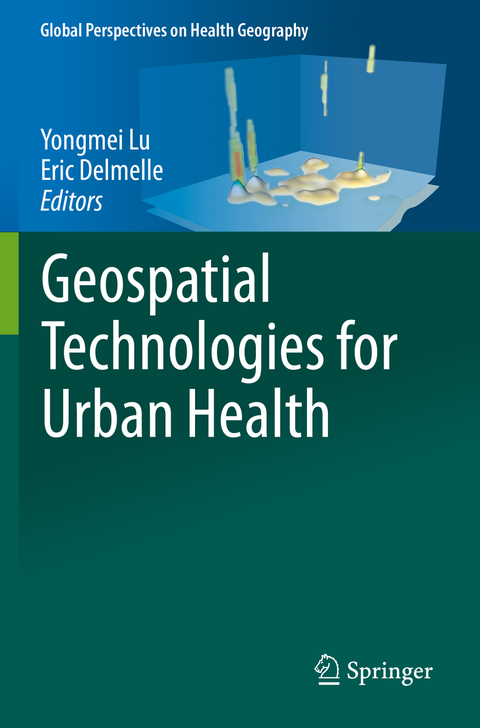
Geospatial Technologies for Urban Health
Springer International Publishing (Verlag)
978-3-030-19575-5 (ISBN)
This volume presents a timely collection of research papers on the progress, opportunities, and challenges related to the advancement of geospatial technologies for applications in urban health research and management. The chapter authors cover technologies ranging from traditional GIS and remote sensing technologies, to recently developed tracking/locational technologies and volunteered geographic information (VGI). In four main sections, the book uniquely contributes to the conversation of how geospatial technologies and other GIScience research may be enhanced by addressing the data and challenges presented by urban health issues. The book is intended for those with backgrounds in health and medical geography, social epidemiology, urban planning, health management, and lifestyle research.
The book starts with an introduction by the editors, providing an overview of traditional and emerging geospatial technologies and how they each can significantly contribute to urban health studies. Section 1 covers urban health risk and disease, and analyses the spatial and temporal patterns of selected urban health issues. Section 2 addresses urban health service access, and demonstrates how traditional and new geospatial technologies apply to different segments of urban populations facing varied challenges. Section 3 focuses on incorporating geospatial technologies in promoting healthy behaviours and lifestyles in urban settings. Section 4 assesses how geospatial technologies may be incorporated into urban health policies and management practices. Adopting a forward-looking perspective, these papers examine the various health challenges in urban systems, and explore how new and emerging geospatial technologies will need to develop to address these problems.
Dr. Yongmei Lu is a Professor and Associate Chair in the Department of Geography at Texas State University. She earned her Masters degree in Geography at Peking University, Beijing in 1994, and her PhD in Geography at SUNY Buffalo in 2001. She has co-edited 1 book volume, 1 journal special issue, and has co-written over 40 papers in peer-reviewed journals. Her research interests include GIScience, urban and regional analysis, health and medical geography, and crime geography.
Dr. Eric Delmelle is an Associate Professor in the Department of Geography & Earth Sciences at University of North Carolina at Charlotte. He received his M.A. in Geography at SUNY Buffalo in 2001, his M.S. in Industrial Engineering at SUNY Buffalo in 2004, and his PhD in Geography at SUNY Buffalo in 2005. He has co-edited 1 book volume, co-written over 45 papers in peer-reviewed journals and 15 articles in edited books and conference proceedings, and has participated in over 80 conference proceedings and invited talks. His teaching and research interests include spatial optimization, GIS, geovisualization, epidemiology, uncertainty, and spatial analysis and modeling.
Chapter 1. Introduction.- Part I. Urban Health Risk and Disease.- Chapter 2. Geospatial Approaches to Measuring Personal Heat Exposure and Related Health Effects in Urban Settings.- Chapter 3. Geographic variation in Cardiovascular disease mortality: A study of linking risk factors and built environment at a local health unit in Canada.- Chapter 4. Evaluating the effect of domain size of the Community Multiscale Air Quality (CMAQ) model on regional PM2.5 simulations.- Part II- Urban Health Service Access.- Chapter 5. Serving a Segregated Metropolitan Area: Disparities in Spatial Access to Primary Care Physicians in Baton Rouge, Louisiana.- Chapter 6. Considerations When Using Individual GPS Data in Food Environment Research: A Scoping Review of 'Selective (Daily) Mobility Bias' in GPS Exposure Studies and its Relevance to the Retail Food Environment.- Chapter 7. Dynamic Emergency Medical Service Dispatch: Role of Spatiotemporal Machine Learning.- Part III. Healthy Behavior and Urban Lifestyle.- Chapter 8. Incorporating Online Survey and Social Media Data into a GIS Analysis for Measuring Walkability.- Chapter 9. Leveraging social media to track urban park quality for improved citizen health.- Part IV. Health Policies and Urban Health Management.- Chapter 10. Spatio-temporal Analysis and Data Mining of the 2014-2016 Ebola Virus Disease Outbreak in West Africa.- Chapter 11. Extending Volunteered Geographic Information (VGI) with Geospatial Software as a Service: Participatory Asset Mapping Infrastructures for Urban Health.- Chapter 12. Improving Urban and Peri-Urban Health Outcomes Through Early Detection and Aid Planning.
| Erscheinungsdatum | 20.10.2020 |
|---|---|
| Reihe/Serie | Global Perspectives on Health Geography |
| Zusatzinfo | XI, 259 p. 60 illus., 49 illus. in color. |
| Verlagsort | Cham |
| Sprache | englisch |
| Maße | 155 x 235 mm |
| Gewicht | 421 g |
| Themenwelt | Naturwissenschaften ► Geowissenschaften ► Geografie / Kartografie |
| Sozialwissenschaften ► Soziologie ► Spezielle Soziologien | |
| Schlagworte | Built Environment • Cartography • Disease risk • GIS technology • Medical Geography • Space-time analysis • urban geography and urbanism • Urban health culture • Urban health management • Urban health policy |
| ISBN-10 | 3-030-19575-9 / 3030195759 |
| ISBN-13 | 978-3-030-19575-5 / 9783030195755 |
| Zustand | Neuware |
| Informationen gemäß Produktsicherheitsverordnung (GPSR) | |
| Haben Sie eine Frage zum Produkt? |
aus dem Bereich


